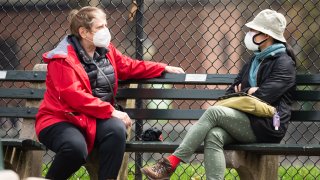
- The WHO urged fully vaccinated people to continue to wear masks and practice other Covid-19 pandemic safety measures as the highly contagious delta variant spreads rapidly across the globe.
- "People cannot feel safe just because they had the two doses. They still need to protect themselves," WHO official Dr. Mariangela Simao told reporters.
The World Health Organization on Friday urged fully vaccinated people to continue to wear masks, social distance and practice other Covid-19 pandemic safety measures as the highly contagious delta variant spreads rapidly across the globe.
"People cannot feel safe just because they had the two doses. They still need to protect themselves," Dr. Mariangela Simao, WHO assistant director-general for access to medicines and health products, said during a news briefing from the agency's Geneva headquarters.
"Vaccine alone won't stop community transmission," Simao added. "People need to continue to use masks consistently, be in ventilated spaces, hand hygiene ... the physical distance, avoid crowding. This still continues to be extremely important, even if you're vaccinated when you have a community transmission ongoing."
Get top local stories in Southern California delivered to you every morning. Sign up for NBC LA's News Headlines newsletter.
The health organization's comments come as some countries, including the United States, have largely done away with masks and pandemic-related restrictions as the Covid vaccines have helped drive down the number of new infections and deaths.
The number of new infections in the U.S. has held steady over the last week at an average of 11,659 new cases per day, according to data compiled by Johns Hopkins University. Still, new infections have been plummeting over the last several months.
Money Report
WHO officials said they are asking fully vaccinated people to continue to "play it safe" because a large portion of the world remains unvaccinated and highly contagious variants, like delta, are spreading in many countries, spurring outbreaks.
The Wall Street Journal reported Friday that about half of adults infected in an outbreak of the delta variant in Israel were fully vaccinated with the Pfizer-BioNTech vaccine, prompting the government there to reimpose an indoor mask requirement and other measures.
"Yes, you can reduce some measures and different countries have different recommendations in that regard. But there's still the need for caution," Dr. Bruce Aylward, a senior advisor to the WHO's director-general, said at the briefing. "As we are seeing, there are new variants emerging."
The WHO said last week that delta is becoming the dominant variant of the disease worldwide.
WHO officials have said the variant, first found in India but now in at least 92 countries, is the fastest and fittest coronavirus strain yet, and it will "pick off" the most vulnerable people, especially in places with low Covid vaccination rates.
They said there were reports that the delta variant also causes more severe symptoms, but that more research is needed to confirm those conclusions. Still, there are signs the delta strain could provoke different symptoms than other variants.
It has the potential "to be more lethal because it's more efficient in the way it transmits between humans and it will eventually find those vulnerable individuals who will become severely ill, have to be hospitalized and potentially die," Dr. Mike Ryan, executive director of the WHO's health emergencies program, said Monday.
In the U.S., President Joe Biden said Covid deaths nationwide will continue to rise due to the spread of the "dangerous" delta variant, calling it a "serious concern."
He warned that Americans who are still unvaccinated are especially at risk.
"Six hundred thousand-plus Americans have died, and with this delta variant you know there's going to be others as well. You know it's going to happen. We've got to get young people vaccinated," Biden said Thursday at a community center in Raleigh, North Carolina






